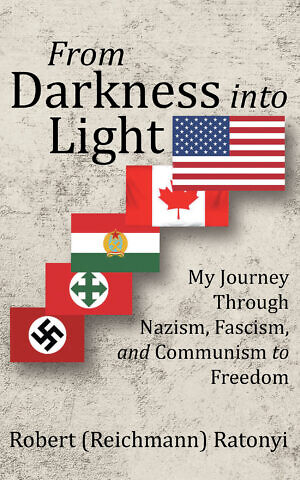Ratonyi’s Epic Journey ‘From Darkness into Light’
Robert Ratonyi outlines his journey through horrors of the Holocaust as a child, from fascism and communism and ultimately to freedom and triumph.
Can you even imagine a six-year-old child trying to process the events occurring during 1944 in Budapest, Hungary, when Nazi sympathizing Hungarian troops forced Robert Ratonyi, as a young boy, and countless other Jews, into a fenced ghetto?
Ratonyi’s memoir, “From Darkness into Light: My Journey Through Nazism, Fascism, and Communism to Freedom,” was originally written as a series of short stories to leave behind so his grandchildren could learn about the details of his life. As I read it, I tried to put myself into his shoes as I began the journey along with his words.
I have to confess that this was not an easy task as I found it painful to walk in his shoes during the time he spent living through the Holocaust. Having to recount the horrors of that time to tell his story could not have been easy.
In 1942, Ratonyi’s father was taken to work in a forced labor camp where he never saw his son again and ultimately died. His mother was then taken from him and forced to work in an Austrian concentration camp as well. Thankfully, she was able to survive and overcome her ailments upon reuniting with her family. It was Ratonyi’s friends, grandparents, cousins and various other family members who were able to look after him, ensuring his survival during this terrible time. With that survival there has to be lifelong scars that follow.

Once reunited with his mother and being liberated from Nazism, Ratonyi then takes us on a journey through 11 years of living under Communism and an uprising in 1956. Life in Hungary was not easy under Soviet rule and a Socialist-based society. Ratonyi is the epitome of the expression “making the best of a bad situation.” He forged ahead, graduating from high school with good grades and getting accepted to attend the Technical University of Budapest.
The next two journeys, the uprising in Hungary and the escape to Austria, marked more pivotal points in Ratonyi’s story. The decision to escape from Hungary to start a new life without his family had to be agonizing. From what I read, the bond between his mother and family was very strong and leaving had to be a very difficult decision. I remember moving from New York to Atlanta in 1980, leaving my family behind. At that time working for Eastern Airlines afforded me the luxury of jetting back to see my family as often as I wanted. This pales in comparison to having made a dangerous crossing over the Hungary border into Austria, knowing that Ratonyi could not simply see family again unless they made the treacherous escape as well. It’s amazing what we take for granted today.
The last journey, which I must say was the least painful and most uplifting to read, was the immigrant years spent living in Canada and the United States. I was extremely impressed with the work ethic and determination that Ratonyi exemplified pursuing his career in engineering. With the support and influence of his future father-in-law, Ratonyi made yet another bold decision to leave Montreal to attend Massachusetts Institute of Technology in Boston. In an interview I had with the author, he told me this was “one of the riskiest moves he ever made.” Graduating from MIT, one of the most prestigious schools in the country, is no small feat, as only the best of the best get to attend.

The book skillfully outlines his journey as he navigates through the horrors of the Holocaust to fascism to communism and then ultimately to freedom. It is a must read, not only for its historical content, but because this type of story needs to be retold countless times, so we do not forget. I find it hard to believe that people, even today, can deny the Holocaust. It is a story of good triumphing over evil by sheer determination and relentless hard work. I was also impressed with the strength and sacrifices this family made to overcome all obstacles to make the best of a bad situation. I know writing, researching and then having to recount all this material in this memoir, which had him reaching out to relatives all around the world to fill in the details of this journey. had to be a daunting task for Ratonyi.
I asked Ratonyi what he would want to leave his readers with after finishing this incredible journey. He responded, “Let me mention the objective I had in mind to write my five ‘journeys’ that cover 26 years of my life. These journeys are eyewitness accounts of historic events in the 20th century in the middle of Europe. I am today, more than half a century later, the product of those experiences. I learned some important lessons and drew some conclusions.
“I learned lessons about the human capacity for love, kindness and self-sacrifice, as well as hate and cruelty during the Holocaust. I learned the importance of family and having a role model to provide guidance on what is important to grow up with and be a responsible, sensible and sensitive person. I learned that pain and suffering in childhood, or how poor you are growing up, need not have a negative impact on your self-esteem. I learned that socialism and communism are failed utopian ideologies, and history has proven that they always result in misery, not to mention the moral corruption that inevitably results from a totalitarian system,” he continued.

“I learned the importance of setting goals, taking risks, working hard, and delaying gratification to achieve those goals. Being an immigrant in Canada, and then in the U.S., I learned how to start out with no material possessions, not even speaking English, and end up as a highly educated, productive member of society in a few years.”
I look forward to hearing him speak one day where he is now a regular speaker on behalf of the William Breman Jewish Heritage and Holocaust Museum and the Georgia Commission on the Holocaust. Let us never forget.



comments